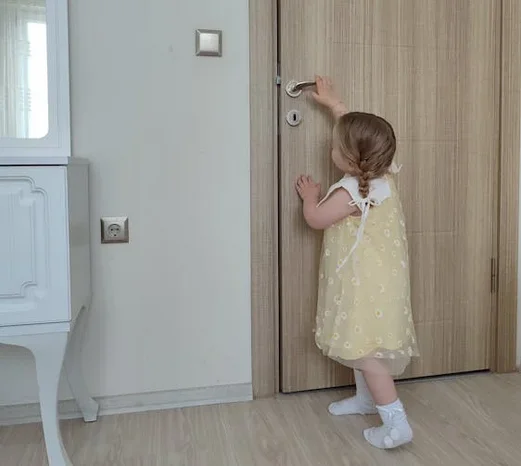Long before parenting books cluttered shelves and child psychology became dinner table conversation, families of the 1970s operated on a set of unwritten rules that everyone somehow just knew. There was no family mission statement hanging on the refrigerator or behavior chart with gold stars—just clear expectations that were absorbed through the atmosphere of our wood-paneled living rooms. These unspoken guidelines shaped an entire generation, creating shared experiences that still bring knowing nods when mentioned at class reunions or holiday gatherings.
1. When the Streetlights Came On, You Better Be Home

No parent needed to spell out this universal deadline that governed childhood throughout America’s neighborhoods. The subtle shift in illumination as dusk settled acted as nature’s alarm clock, sending kids scrambling from backyard games and bike adventures back to their respective homes. This unwritten curfew operated with surprising precision across geographic and socioeconomic boundaries, requiring no digital reminders or parental text messages. Let Grow muses about having children play outside for certain set amount of hours.
Parents somehow trusted that their children would monitor the fading daylight and respond accordingly, a responsibility that children took seriously. Stragglers who ignored this silent signal faced consequences ranging from worried looks to temporary grounding, teaching valuable lessons about respecting boundaries without explicit instruction. The system worked so efficiently that many adults today still feel a Pavlovian urge to head home when they see streetlights flickering to life in the evening.
2. Don’t Change the Channel—Dad Controls the TV

In households with a single television, the unspoken hierarchy of viewing privileges placed Dad firmly at the top of the command chain. The sacred ritual of evening news, followed by whatever sporting event or detective show caught his interest, was not to be interrupted by requests for cartoons or teen programming. Children learned to plan their viewing around Dad’s schedule, memorizing the sacred times when the television kingdom temporarily shifted to Mom’s domain or, more rarely, to their own. TelForce Group explores how clickers changed the landscape of enjoying television in numerous ways.
The remote control—if the family was fortunate enough to own such advanced technology—remained firmly in paternal possession, a scepter of household authority that no one dared request without good reason. This arrangement was accepted with remarkable equanimity, with children negotiating viewing privileges through a complex system of good behavior, special occasions, and strategic alliances with the parent most likely to advocate for their program choices. As homes eventually acquired multiple television sets in later decades, this unspoken rule gradually dissolved, though many families still joke about “Dad’s chair” and its associated viewing privileges.
3. Answer the Phone Properly—You Represent the Family

The shared family telephone—typically mounted on the kitchen wall with its impossibly tangled cord—wasn’t just a communication device but a direct line to your family’s public reputation. Children understood without explicit instruction that answering the phone required their best manners and clearest diction: “Hello, Smith residence, this is Jimmy speaking.” The greeting demonstrated your family’s standards and proper upbringing to whoever might be calling. These days, as explored by The Atlantic, phone etiquette has changed almost beyond all recognition.
Parents could assess your phone etiquette from two rooms away and would shoot warning glances if the greeting lacked appropriate formality or enthusiasm. This unwritten rule instilled the understanding that you weren’t just answering for yourself but representing the entire household to the outside world. As answering machines and then individual cell phones gradually replaced the family telephone, this formal ritual disappeared, along with the nervous anticipation of wondering who might be calling.
4. Don’t Waste Food—People Are Starving Somewhere

The empty plate club wasn’t an organized activity but an expectation that hovered over dinner tables nationwide, reinforced by parental references to children starving in faraway countries. Kids learned early that complaining about dinner or leaving food uneaten wasn’t just disappointing but somehow morally problematic, connecting our fortunate circumstances to global issues in ways we didn’t fully comprehend. The clean plate mandate originated with parents who had experienced Depression-era scarcity or post-war rationing, for whom food waste represented something genuinely troubling.
The mysterious connection between your Brussels sprouts and hungry children across the ocean created a peculiar childhood logic that we rarely questioned. Children sat at tables long after others had finished, negotiating with particularly offensive vegetables while parents reminded them of their fortunate circumstances. This unspoken rule created a generation that still feels a twinge of guilt when restaurant portions go unfinished, even as we’ve learned more nuanced approaches to discussing global hunger with our own children.
5. Don’t Call During Dinner Hours Unless It’s an Emergency

Between the hours of roughly 5:30 and 7:00 PM, the family telephone entered a period of sacred silence out of respect for the dinner hour. Calling during this window without genuine urgency signaled that your family lacked proper boundaries or respect for mealtime traditions. Children learned to time their social calls carefully, understanding that the adult who answered would likely inquire whether everything was alright if you dared ring during this protected timeframe.
This mutual telecommunications courtesy operated on reciprocal understanding across neighborhoods and social circles. Parents reinforced this rule by their own behavior, often answering calls during dinner with a slightly concerned tone that communicated the implicit question: “Why are you calling now?” As family dinners became less synchronized across households and individual mobile phones eliminated shared answering duties, this unspoken social contract gradually dissolved.
6. When Adults Are Talking, Don’t Interrupt

Children in the ’70s absorbed through observation that adult conversations operated under different rules than their own social interactions. When grown-ups were speaking, children maintained a respectful distance and waited for acknowledgment before sharing their thoughts or needs. This invisible boundary between adult and child communication wasn’t usually explained—it was demonstrated through subtle cues like raised eyebrows or a gentle hand on the shoulder when a child forgot their place in the conversational hierarchy.
The phrase “children should be seen and not heard” may have been considered old-fashioned even then, but its essence remained in practice. Young people learned to gauge the seriousness of adult discussions and adjust their interruption threshold accordingly, developing an intuitive sense for when their input would be welcomed versus tolerated. This unspoken rule taught valuable lessons about reading social cues and respecting others’ conversations—skills that many adults now find lacking in subsequent generations raised with more child-centered communication styles.
7. Saturday Morning Is for Cartoons—Don’t Wake the Parents

Weekend mornings operated under a delicate agreement that benefited both generations: children gained unrestricted access to cartoon programming while parents received precious additional sleep. Kids learned to navigate this special time with remarkable independence, pouring their own cereal and maintaining reasonable volume levels while enjoying animated entertainment that only appeared during this weekly window. The unwritten contract required no formal negotiation but was understood and honored by parties on both sides.
Parents trusted children to manage basic self-care during these hours, while children respected the invisible barrier between the living room and parental bedroom. This arrangement fostered early independence skills and special bonds between siblings who shared these weekly rituals away from adult supervision. As cartoon programming eventually spread throughout the week on cable channels and streaming services made everything available on-demand, this special Saturday morning territory gradually lost its significance for subsequent generations.
8. If You Make That Face, It Might Freeze That Way

Long before medical journals debunked this anatomical impossibility, children accepted the mysterious principle that facial contortions carried permanent consequences if maintained too long. This curious belief traveled through generations without scientific support, yet children regarded it with sufficient seriousness to moderate their most extreme expressions. Parents delivered this warning with such conviction that even skeptical children hesitated to test its boundaries too thoroughly.
The unspoken rule served as an effective deterrent to disrespectful expressions and excessive grimacing that might offend relatives or neighbors. Children developed a healthy respect for the strange possibility that their features might betray them by freezing mid-scowl, particularly when crossing their eyes or sticking out tongues. This peculiar superstition persisted despite children never actually encountering anyone whose face had suffered this fate, demonstrating the remarkable power of unverified parental warnings on impressionable minds.
9. The Back Seat Is for Kids, No Matter How Crowded

Before car seats and seatbelt laws transformed family travel, the division of automotive territory remained clearly defined without explicit discussion. Children automatically claimed the back seat while adults occupied the front, regardless of how many people needed to squeeze into either section. This spatial hierarchy remained unquestioned even when it meant three or four children crammed together while a single adult passenger enjoyed spacious front-seat accommodations.
The front passenger seat represented a significant status symbol that children could only aspire to through patience and aging. Occasional exceptions might be granted for special occasions or very short trips, creating memorable moments of pride when a child was temporarily granted front-seat privileges. This unwritten seating arrangement established clear generational boundaries within the family vehicle, simultaneously reinforcing parental authority while creating shared experiences among siblings assigned to the back-seat domain.
10. When Company Comes, You’re On Your Best Behavior

The transformation from everyday family dynamics to “company manners” occurred without formal announcement, triggered by the simple arrival of guests at the front door. Children instinctively understood that visitor presence elevated behavioral expectations, requiring their politest language, proper posture, and most restrained impulses. The unspoken rule extended to appearance as well, with many families maintaining designated “company clothes” that mysteriously appeared before special visitors arrived.
Children learned to read parental signals indicating when normal household rules shifted to the heightened standards of company protocol. A certain parental glance communicated volumes about appropriate topics and acceptable volume levels without a word being exchanged. This unwritten social contract taught children to adapt their behavior to different social contexts, developing situational awareness that would serve them throughout life in professional and social settings alike.
11. Long Distance Calls Are for Emergencies and Special Occasions Only

The distinctive sound of someone dialing a long-distance number triggered immediate household attention, as everyone understood these calls incurred significant per-minute charges. Children absorbed through observation that these expensive connections were reserved for important information, holiday greetings, or communications with far-away family members experiencing significant life events. The unspoken rule governed not just when these calls could be placed but their necessary brevity once connected.
Parents didn’t need to explain the economics—children observed the careful timekeeper role that adults adopted during these calls, watching wall clocks and wrapping up conversations efficiently. The precious nature of long-distance communication made these calls events in themselves, often with family members taking turns speaking to distant relatives while everyone listened to both sides of the conversation. As telecommunications evolved to eliminate distance-based pricing, younger generations lost this intuitive understanding of conversation as an occasional luxury rather than constant backdrop.
12. The Good Dishes Are Only for Holidays and Special Visitors

Most ’70s households maintained a clear distinction between everyday tableware and the “good dishes” that emerged from china cabinets only for noteworthy occasions. Children understood without explanation that the appearance of these special plates, often accompanied by cloth napkins and proper water glasses, signaled elevated expectations for mealtime behavior. The unwritten rule extended to understanding which visitors warranted this special treatment, creating a subtle household hierarchy that children quickly internalized.
The process of carefully removing these dishes from their protective storage and properly returning them afterward became a multi-generational ritual that children observed with curiosity before eventually participating. This unspoken tradition reflected values about respecting special possessions, acknowledging important relationships, and marking significant occasions through tangible differences in everyday routines. As casual entertaining gradually replaced formal dining experiences, many families found their special occasion dishes appearing less frequently before eventually being passed to the next generation or donated entirely.
13. If the Door Is Closed, Knock First—Always

Privacy boundaries operated through an unspoken understanding that closed doors represented deliberate barriers requiring acknowledgment before crossing. Children learned through observation and occasional reminders that a closed door—whether to a bedroom, bathroom, or home office—required a respectful knock and verbal permission before entry. This simple courtesy extended across generational lines, with parents generally modeling the same respect for children’s closed doors that they expected for their own.
The rule operated with particular emphasis regarding the primary bathroom during morning routines when multiple family members navigated shared spaces on tight schedules. Children who violated this unwritten rule quickly learned its importance through embarrassing encounters that required no additional parental lectures to reinforce. This mutual respect for private space fostered a household culture where individual boundaries were acknowledged despite the relatively limited square footage of typical ’70s homes compared to later decades.
These unspoken rules governed family life more effectively than any written contract, creating shared understandings that defined an era of childhood. While some reflect outdated social structures or unnecessary limitations, many taught valuable lessons about respect, boundaries, and community responsibility that transcend generational differences. The ’70s parent didn’t need parenting books or online forums to establish household expectations—they simply maintained traditions that children absorbed through daily life, creating the framework for family functioning that many now recall with both amusement and appreciation.


